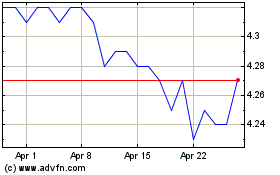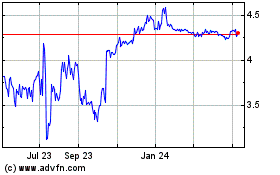Companies To Press Lawmakers, Regulators For Better Trading Data
March 07 2011 - 4:48PM
Dow Jones News
U.S. companies are becoming concerned that the country's
fragmented stock trading sector has made it difficult to track
their ownership and assess what impact corporate announcements will
have on their share prices.
A group of companies plan to press lawmakers and regulators for
greater disclosure about who buys and sells their shares each day,
and why--a task complicated by the scattered nature and lightning
speed of trading in the electronic age.
"Having good trading data are key to knowing what trading
behaviors react to earnings and news," said Derek Drysdale,
director of investor relations for tax preparer H&R Block Inc.
(HRB).
With more and more trades arranged privately--rather than
through the big exchanges--"it's more difficult to tell if real
volume or just noise is causing our stock price to go up or down,"
he said.
H&R Block and other companies want a better view into where
their stocks are being traded, and who's doing the buying, selling
and shorting. Currently, issuers rely on officials at the exchange
that lists their shares, or third-party services, to provide a
window on trading.
Evolving U.S. market regulation has clouded that window.
Thirteen domestic stock exchanges now compete for business against
dozens of private electronic trading platforms, known as "dark
pools," as well as Wall Street banks that trade millions of shares
internally and then report them to market supervisors. In February,
about one-third of all U.S. share-trading was done away from
publicly accessible exchanges.
The shift, driven by regulators' efforts over the past decade to
make markets more competitive for stock investors, has
disadvantaged the public companies whose equity provides fuel for a
market that trades more than 8 billion shares per day, according to
analysis firm ModernIR LLC.
"We have a construct today that's antithetical to capital
formation," said Tim Quast, managing director for the firm, which
is leading the push for greater transparency into
share-dealing.
H&R Block's Drysdale estimated that 60% of the trading in
his company's shares was driven by high-frequency traders that are
not long-term investors, with more than two-thirds of deals done
away from its listing venue at NYSE Euronext (NYX).
Quast and others point to regulation as a catalyst for
reorienting U.S. securities markets around speed and trading. A
requirement that trades take place at the best price available
nationally, alongside a lower bar for introducing new trading
platforms, has slashed costs for retail investors and ushered in a
generation of high-speed electronic firms that rapidly buy and sell
across dozens of venues.
Amassing and analyzing market data is a key component of
professional traders' business, but share-issuing companies
frequently say they have little clue what drives much of the
activity in their stock, causing headaches when trying to measure
the impact of earnings reports or institutional interest in their
company.
"For us, as the market activity continues to fragment, our data
become less complete," said Matt Smith, treasurer for Consolidated
Communications Holdings Inc. (CNSL), a telephone service company
listed on the Nasdaq Stock Market. "It's disconnected from more
transparency in other facets of the marketplace."
Exchanges, dark pools and firms that internally match up stock
trades all report business into a "consolidated tape" which
compiles daily trading activity. Public companies like Consolidated
Communications and H&R Block want the Securities and Exchange
Commission to direct the disclosure of broker data that goes into
the consolidated tape, giving companies a closer approximation of
the data that traders use.
"There is unfair discrimination in markets today," ModernIR
officials wrote in a letter that the company expects will be signed
by up to 100 companies and submitted to members of the House
Financial Services Committee and the SEC. "This effort will level
the playing field for public companies."
Representatives for NYSE Euronext, Nasdaq OMX, BATS Global
Markets and Direct Edge had no immediate comment, but Quast said
exchanges have not objected to the effort.
A spokeswoman for the Financial Industry Regulatory Authority,
which oversees U.S. securities firms, declined comment.
Representatives of the SEC did not respond to a request for
comment.
The coalition of companies and ModernIR intend to firm up their
group and formally submit their request to lawmakers in late March,
in time to put the issue on the legislative agenda for April and
May, Quast said.
-By Jacob Bunge, Dow Jones Newswires; 312-750-4117;
jacob.bunge@dowjones.com
Consolidated Communicati... (NASDAQ:CNSL)
Historical Stock Chart
From Mar 2024 to Apr 2024

Consolidated Communicati... (NASDAQ:CNSL)
Historical Stock Chart
From Apr 2023 to Apr 2024
